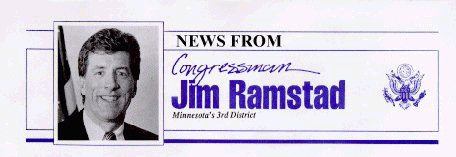

| FOR IMMEDIATE
RELEASE September 29, 1999 |
CONTACT: Dean
Peterson (202) 225-2871 |
RAMSTAD URGES HCFA TO WORK FOR AMERICAN SENIORS;
HEALTH SUBCOMMITTEE OF WAYS AND MEANS TO HOLD HEARING
WASHINGTON – Health Subcommittee member Jim Ramstad (R-MN) made the following statement before the House today in anticipation of Friday's Ways and Means Health Subcommittee Hearing on refinements to the Medicare provisions of the Balanced Budget Act.
The hearing will take place at 10:00 am on Friday, October 1, in the main Committee hearing room, 1100 Longworth House Office Building.
"Mr. Speaker, I rise today in frustration – frustration with a government agency that may be even more disliked than the IRS.
My friends on the Health Subcommittee in Ways and Means, and many of my other colleagues, know what I am talking about – HCFA.
Mr. Speaker, on Friday our Subcommittee will be holding a hearing on refinements to the BBA. As we plan for this hearing, I hope, for once, this Administration will not appear before us and insult our intelligence. I will be asking some tough questions about their handling of the Medicare program of late, and I hope I do not hear that the agency is unable to address any of the concerns we are hearing about from Medicare providers because the agency's hands are completely tied by "prescriptive" BBA language.
We hear these lines about 'prescriptive language' and 'Congressional intent' when the Administration doesn't want to do things -- but when it does want to do something, it is perfectly comfortable with ignoring bill language and/or Congressional intent.
Some of the problems we are hearing about in Medicare from health care providers are all results of actual BBA language. Some are, and the Health Subcommittee is planning to provide some relief in those areas. But, as Senator Roth and Chairman Thomas have noted recently, there is a lot HCFA can do, too.
The BBA gives HCFA significant power over how things are implemented. The risk adjuster for Medicare+Choice payments is an excellent example. Many of my colleagues and I have heard concerns about the risk adjuster the Administration has designed. One very important concern is how it will impact some very special programs, especially innovative programs for the frail elderly.
HCFA obviously understands the grave impact the interim risk adjuster will have on these programs and exempted them from the risk adjuster for the first year. But the argument which compelled the agency to exempt them for one year remains the same, and just as powerful, for all the years under the interim risk adjuster.
Now, I may just be a Norwegian from the land of Lake Wobegon – but what I cannot understand is why the agency is not exempting them for the entire interim period. If they have the authority to do it for one year, it would seem that they have it for multiple years. And, conversely, if they don't have the authority for all the years, how did they have it for one? I see nothing in the BBA which explicitly prohibits the agency from exempting them for more than one year!
But even if I were to accept HCFA's claim that only Congressional action allows a multiple year exemption, that still would not help me understand why HCFA is not supporting my legislation to provide the multiple exemption. They tell providers you need Congress to pass a bill, so I introduce one. Then they come up with multiple, weak arguments against the bill.
Mr. Speaker, I am offering to address any substantive concerns in a reasonable way – and I hope we will be having such an exchange on Friday. I invite the Administration to join me, for the sake of frail, elderly beneficiaries in Minnesota and the nation."
#30#